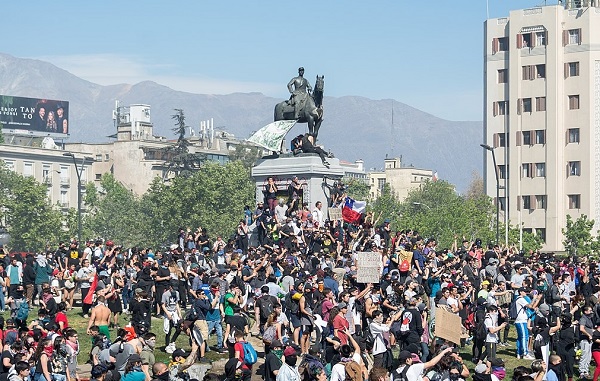Santiago, Thousands of Chilean protesters have once again occupied capital Santiago’s Plaza Italia square for an 18th day of anti-government demonstrations.
The “Super Monday” mobilization was convened by the Social Unity Roundtable, a coalition of some 70 labour unions and grassroots organizations, reports Efe news.
Traffic moved normally through the busy square on Monday morning amid isolated confrontations between hooded activists and members of the Carabineros, Chile’s militarized national police.
But protesters began streaming into Plaza Italia by mid-afternoon and filled the square within hours.
Participants carried signs with slogans such as “All power to the assemblies”, referring to the town-halls promoted by Social Unity with the aim of formulating a coherent program and set of demands.
The movement, which brought 1.2 million people – more than 5 per cent of Chile’s population – into the centre of Santiago on October 25, is characterized by its disenchantment with politicians and the institutions of government.
Hundreds also congregated earlier on Monday outside Congress to reject measures put forward by right-wing President Sebastian Pinera to address the causes of popular discontent.
Lawmakers were on Tuesday scheduled to debate a government proposal to boost retirement pensions, but within the existing framework of the AFP system of private pension fund administrators that sees some retirees receive as little as $200 a month.
The proximate cause for Chile’s largest eruption of protests since the end of the Pinochet dictatorship was an increase in transit fares in Santiago, but the grievances quickly expanded to include low pay and pensions, student debt and poor health care, among other issues.
At least 20 people have died since the start of the uprising, while thousands more have suffered injuries.
Pinera’s initial reaction to the protests was to declare a state of emergency and order troops and tanks into the streets. He subsequently changed tack, overhauling his Cabinet and offering a package of reforms.
Activists, however, speak of a complete transformation of the political, social and economic model, starting with the creation of a constituent assembly to draft a new constitution.










